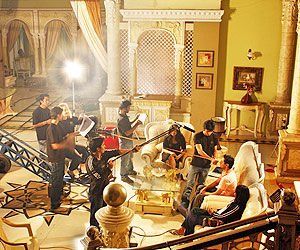Exploring the Impact of Movie Critics and Reviews on the Film
The film industry is a dynamic and ever-evolving landscape, driven by creativity, innovation, and the pursuit of storytelling excellence.

The Essential Role of Movie Critics and Reviews in the Film Industry
The film industry is a dynamic and ever-evolving landscape, driven by creativity, innovation, and the pursuit of storytelling excellence. At the heart of this multifaceted industry lies a crucial element that often goes unnoticed by casual moviegoers: movie critics and reviews. Movie critics play a pivotal role in shaping the film industry, influencing audience preferences, and facilitating constructive discourse around cinematic artistry. In this article, we will explore the essential role of movie critics and reviews in the film industry, delving into their history, impact, and relevance in today's digital age.
?The Historical Perspective
To understand the significance of movie critics and reviews in the film industry, we must first take a journey through history. The concept of film criticism dates back to the early days of cinema, with pioneers like Georges M?li?s and Thomas Edison, who not only created films but also analyzed and discussed them. However, it was in the 20th century that film criticism gained prominence, particularly with the emergence of film magazines and newspapers.
- The Birth of Film Criticism: Film criticism as we know it today can be traced back to the 1910s and 1920s, when publications like "Variety" and "The New York Times" began publishing reviews of films. Critics such as Otis Ferguson and Andr? Bazin provided thoughtful analyses, setting the stage for a more critical approach to cinema.
- The Golden Age of Film Critics: The mid-20th century witnessed the rise of influential film critics like Pauline Kael and Roger Ebert, whose reviews held considerable sway over public opinion. Their insights and critiques helped audiences navigate the rapidly expanding world of cinema.
The Influence of Movie Critics
Movie critics and their reviews have a profound impact on various aspects of the film industry, including:
- Audience Decision-Making: Moviegoers often rely on critics' reviews to make informed choices about which films to watch. Positive reviews can boost a film's box office performance, while negative ones may deter audiences.
- Quality Assessment: Critics serve as a quality control mechanism, helping to distinguish between high-quality filmmaking and mediocre productions. Their reviews can motivate filmmakers to strive for excellence.
- Awards and Recognition: Critics' opinions play a significant role in the selection of films for prestigious awards such as the Oscars and Golden Globes. Winning critical acclaim can elevate a film's chances of receiving industry recognition.
- Cinematic Legacy: Iconic films are often remembered through the lens of critical reviews. Positive reviews can contribute to a film's lasting legacy, making it a timeless classic.
The Evolving Landscape
In recent years, the film industry has undergone significant transformations, driven by technological advancements and changing consumer behaviors. This evolution has also impacted the role of movie critics and reviews.
- Digital Platforms: With the rise of the internet and digital platforms, film reviews are more accessible than ever before. Online publications, social media, and video reviews have broadened the reach of critics, democratizing film criticism.
- Audience Participation: Audiences have become active participants in the review process, sharing their opinions on social media and review aggregator websites like Rotten Tomatoes and IMDb. This has diversified the range of voices contributing to film discourse.
- Challenges and Criticisms: The democratization of film criticism has also led to challenges, such as the rise of "cancel culture" and the perception of critics as disconnected from mainstream tastes. Critics are now navigating the fine line between offering genuine critique and being overly influenced by public sentiment.
The Balance of Subjectivity and Objectivity
One of the enduring debates in film criticism revolves around the balance between subjectivity and objectivity. Critics are, by nature, subjective in their assessments, as their reviews reflect personal preferences and biases. However, they also strive for objectivity by evaluating films based on criteria such as storytelling, cinematography, acting, and editing.
- The Subjective Element: Critics' personal tastes can lead to divergent opinions about the same film. This diversity of perspectives adds depth to the discourse around cinema, allowing for a richer understanding of a film's impact on different audiences.
- Objective Evaluation: Critics employ objective criteria to assess technical aspects of filmmaking, providing valuable insights into a film's craftsmanship. This objectivity helps audiences appreciate the artistry behind the scenes.
?The Future of Film Criticism
As we look ahead, the role of movie critics and reviews in the film industry is likely to continue evolving. Several trends are shaping the future of film criticism:
- Diversity and Inclusion: Film criticism is becoming more inclusive, with a growing number of critics from diverse backgrounds. This diversity brings fresh perspectives and challenges the traditional norms of criticism.
- Interactivity: Critics are increasingly engaging with their audiences through live discussions, Q&A sessions, and social media interactions. This direct engagement enhances the overall viewing experience.
- Hybrid Models: Some critics are embracing hybrid roles, working as both reviewers and content creators on platforms like YouTube and podcasts. This allows for more dynamic and multimedia critiques.
- Global Reach: Film criticism is no longer confined to English-language markets. Critics from around the world are gaining recognition, making international cinema more accessible to a global audience.
The Responsibility of Film Critics
With their influential position in the film ecosystem, film critics bear a significant responsibility. They not only have the power to shape public perception but also the potential to impact the careers of filmmakers and the industry as a whole. This responsibility comes with several key aspects:
- Ethical Conduct: Critics are expected to maintain a high level of integrity and professionalism in their work. This includes disclosing any conflicts of interest, avoiding personal attacks, and being transparent about their biases.
- Constructive Critique: While critics are entitled to their opinions, constructive criticism is invaluable. Offering feedback that is insightful and actionable can aid in the growth and improvement of the film industry.
- Supporting Diversity: Critics play a vital role in promoting diversity and inclusion in cinema. They can help champion underrepresented voices and highlight the importance of diverse storytelling.
- Preserving Film History: Critics also serve as historians, helping to preserve the rich history of cinema by documenting and analyzing films from various eras. This archival work ensures that future generations can appreciate the evolution of the art form.
The Interplay Between Critics and Filmmakers
The relationship between critics and filmmakers is often characterized by tension, as critics provide feedback that can be both laudatory and critical. However, this dynamic can be constructive when handled with professionalism and mutual respect.
- Critics as a Mirror: Filmmakers can view critics as a mirror reflecting audience sentiments and expectations. Constructive criticism can guide them in making more informed creative choices in future projects.
- Collaboration: Some filmmakers actively engage with critics and value their feedback. This collaborative approach can lead to a better understanding of the film's intentions and artistic choices.
- Critics as Advocates: Critics can act as advocates for films they believe in, helping to generate buzz and interest, especially for independent and lesser-known productions.
- Navigating Negative Reviews: While it can be disheartening, negative reviews are part of the industry. Filmmakers can use them as opportunities for growth and learning, rather than as personal attacks.
The Role of Film Reviews in the Digital Age
In the digital age, film reviews have evolved significantly, adapting to new platforms and formats. This transformation has brought both challenges and opportunities for critics and the industry.
- Instant Access: Online platforms allow for instant access to film reviews, making it easier for audiences to make informed decisions about what to watch.
- User-Generated Reviews: The rise of user-generated reviews on platforms like IMDb and Letterboxd has democratized film criticism, providing a wide range of opinions from the general public.
- Social Media Influence: Social media platforms have amplified the impact of film reviews. Hashtags, trending topics, and viral discussions can greatly influence a film's success.
- YouTube and Podcasts: Many critics have embraced multimedia formats, creating video reviews and podcasts that provide in-depth analysis and commentary, appealing to a diverse range of audiences.
Movie critics and reviews have played a fundamental role in shaping the film industry's trajectory, influencing audience choices, and fostering meaningful discussions about cinema. From its humble beginnings in the early 20th century to its current digital landscape, film criticism has evolved while remaining a crucial component of the industry. As the film industry continues to adapt to changing times, the role of movie critics and reviews remains as essential as ever, bridging the gap between filmmakers and audiences and enriching our understanding of the cinematic art form.
What's Your Reaction?
















